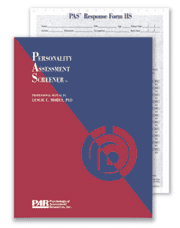
The PAS requires only a 4th-grade reading level, enabling individuals with poor reading skills to provide accurate self-descriptions. It can be used to provide a baseline measure of personality in clinical research.
Purpose:
Screens for a broad range of clinical problems in ages 18 years and older
Age Range:
Adult
Elder Adult
Admin:
Self-report; Individual or group administration
Time:
5 minutes
Qualification:
S or B
Sample Reports:
N/A
Related Products:
PAI® Software Portfolio
Personality Assessment Inventory™
PAI® Law Enforcement, Corrections, and Public Safety Selection Report™ Module for the PAI®-SP
Derived from the Personality Assessment Inventory™ (PAI®), the PAS is designed for use as a triage instrument in most health care and mental health settings, as well as in corporate EAPs and college health services. The 22-item test can be an important part of initial client evaluation by health care and mental health professionals:
This self-administered objective questionnaire was developed with reference to its parent instrument, the PAI®. The 22 PAS items are those items from the PAI that have been identified by extensive item analysis as the most sensitive to the broad range of contemporary clinical problems measured by the PAI. The items are organized hierarchically into 10 different “Elements” representing 10 distinct clinical problem domains:
The 10 individual Element raw scores are summed to determine the PAS Total score, which assesses both the potential for emotional and/or behavioral problems of clinical significance and the need for follow-up evaluation with the PAI or another full inventory of adult personality.
Individual Element scores and the PAS Total score are transformed into probability (P) scores, reflecting the likelihood that the respondent would obtain a problematic profile if he/she completed the full 344-item PAI. These scores were derived from analyses of 2,631 individuals in both clinical and community settings (ages 18 years and older). Normative data are presented for a national community sample of 1,000 adults matched by age, race, and gender to census projections for 1995, as well as for 1,246 clinical participants and 1,051 college students.
PAS materials include the Professional Manual and the 2-part carbonless Form HS Response Form. The bottom part of the Response Form provides scoring and profiling grids with interpretation for PAS Element and Total P scores. The Professional Manual provides information on development, item selection, reliability and validity, internal consistency, empirical structure, administration and scoring, and interpretation of the screening test.


